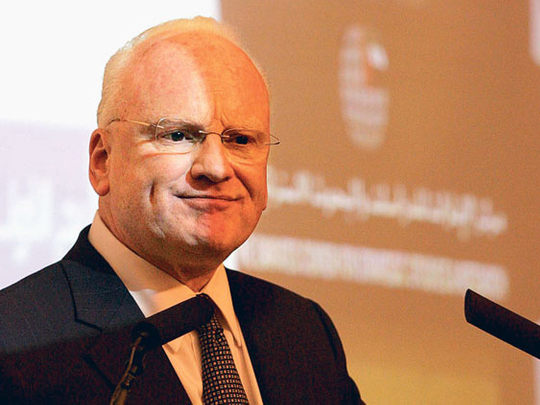
Abu Dhabi: The UAE can lead international efforts to promote global cyber security and cyber peace and to avoid the use of cyberspace for conflict, said a former senior White House adviser on Tuesday.
"The UAE can play a leading role in creating an international system for cyber peace. You can do that not just by computers. But you can do that by strategists and diplomats. And there is a great role for the UAE to play in helping the world step back from cyber war to create an international system for cyber peace," said Richard Clarke, who served as a counterterrorism adviser to Presidents Bill Clinton and George W. Bush.
Warning that cyber war is the next threat to UAE national security, Clarke argued physical defences akin to borders such as firewalls will remain essential, but given the high levels of cross-border connectivity in cyber world, new approaches for cyber security must include the international diplomatic dimension.
Clarke told the audience in a lecture organised by the Emirates Centre for Strategic Study and Research (ECSSR) it has become very important for the world to begin to construct cyber diplomacy.
Deterrence
"Governments will need to start with a concept of what constitutes cyber peace and a code of conduct on what is reasonable behaviour and what is not. Diplomats will need to frame ideas on deterrence, arms control and confidence-building especially appropriate for cyber space," he said.
He added nations needed to organise their defences not only against the threat of cyber war, but also against the daily threat of cyber espionage and cyber crime.
"Moreover, in order to ensure accountability and safety in this new age, there needs to be an open, candid and international discussion on cyber war."
Clarke said cyber attacks can come from another country or from a lone individual. A malicious code may infect a computer via a security flaw in a web browser, or it could be distributed through secret back doors built into computer hardware.
And although the government has set up security measures to protect military and intelligence networks, he worries that not enough is being done to protect the private sector — which includes the electrical grid, the banking system and our health care records.
In October 2009, the Pentagon created a four-star general command called Cyber Command, which is a military organisation with thousands of people in it to go to war using these cyber weapons.
Some estimates claim that between 20 and 30 nations now have cyber warfare units, including Russia, China, Britain, Israel and Iran.
Clarke warned that during wartime, cyber attacks have the potential to reach out from cyberspace into the physical dimension and cause giant electrical generators to shred themselves, trains to derail, high-tension power transmission lines to burn, gas pipelines to explode, aircraft to crash, weapons to malfunction, funds to disappear and enemy units to walk into ambushes.
Short of war, cyber warriors can still engage in malicious activity. Espionage in cyber space is difficult to detect, highly efficient and not restricted to government targets. Indeed cyber warriors are engaged in industrial espionage on a massive scale. Some estimates put the amount of stolen data in the thousands of terabytes — ten times the amount of information stored in the US Library of Congress.
Dubai Richard Clarke served as a counterterrorism adviser to Presidents Bill Clinton and George W. Bush. He spent much of 2001 warning members of the Bush administration about the possibility of an impending Al Qaida attack.
Clarke has now turned his attention to another potential security catastrophe: computer-based terrorism attacks. In his new book, Cyber War: The Next Threat to National Security and What to Do About It, he and co-author Robert Knake sketch out a scenario in which hackers could hypothetically cripple the US from behind a computer screen.
Prior to his White House years, Clarke served 19 years in the Pentagon, the Intelligence Community and the State Department. During the Reagan Administration, he was deputy assistant Secretary of State for Political Military Affairs and coordinated diplomatic efforts to support the 190-1991 Gulf War and subsequent security arrangements.
Profile
Richard Clarke served as a counterterrorism adviser to Presidents Bill Clinton and George W. Bush. He spent much of 2001 warning members of the Bush administration about the possibility of an impending Al Qaida attack.
Clarke has now turned his attention to another potential security catastrophe: computer-based terrorism attacks. In his new book, Cyber War: The Next Threat to National Security and What to Do About It, he and co-author Robert Knake sketch out a scenario in which hackers could hypothetically cripple the United States from behind a computer screen.
Prior to his White House years, Clarke served for 19 years in the Pentagon, the Intelligence Community and the State Department. During the Reagan Administration, he was deputy assistant Secretary of State for Political-Military Affairs and coordinated diplomatic efforts to support the 190-1991 Gulf War and subsequent security arrangements.











